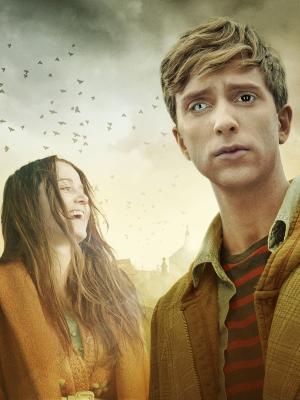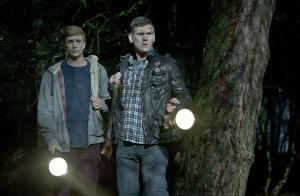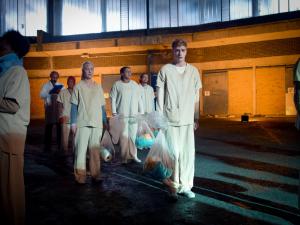In The Flesh Season Two Episodes 3-6
Wednesday, 2 July 2014 - Reviewed by
 In spite of the various risks involved with extending the length of its run second time around, In the Flesh still managed to flourish during the opening two instalments of its second full season. There’s no denying that Dominic Mitchell’s screenplays for these initial episodes lacked some of the spark and wit demonstrated by his contributions to Season One, yet promise was still clearly exhibited by the remarkable performances of the central cast and the increasingly prominent plot arc regarding the First Risen and the looming influence of exterior forces such as the Undead Prophet (though he’s still curiously absent from a physical perspective by the end of the series) on Roarton.
In spite of the various risks involved with extending the length of its run second time around, In the Flesh still managed to flourish during the opening two instalments of its second full season. There’s no denying that Dominic Mitchell’s screenplays for these initial episodes lacked some of the spark and wit demonstrated by his contributions to Season One, yet promise was still clearly exhibited by the remarkable performances of the central cast and the increasingly prominent plot arc regarding the First Risen and the looming influence of exterior forces such as the Undead Prophet (though he’s still curiously absent from a physical perspective by the end of the series) on Roarton. Did the four concluding outings of the fantasy drama which aired on May 18th, May 25th, June 1st and June 8th provide a thrilling send-off for what could be argued as one of the most anticipated runs of fantasy drama this year, or did they merely fulfil our hopes to the same disheartening extent as the England team ‘achieved’ recently at the World Cup in Rio de Janeiro, leaving the show in a purgatorial state in the midst of BBC Three’s impending digitalization akin to Roy Hodgson’s managerial contract? It’s high time that we find out the truth…
Written by Dominic Mitchell
Directed by Jonny Campbell
Produced by Ann Harrison Baxter
Broadcast on BBC Three 18th May 2014
Or “the one where Kieran suddenly acts upon his unspoken romantic attraction towards Simon” (oh, and spoiler alert, if you hadn’t already guessed).
For obvious reasons (not least that the season’s tone took an unexpectedly abrupt turn for the better as a result), many viewers will have left the instalment which marked the halfway point of Season Two with only the memory of Kieran and Simon’s commencement of a hidden sexual relationship behind the back of the latter’s soon-to-be fiancée. This reviewer hopes that, in a day and age where our society should and largely does strive to promote and maintain equal rights for all regardless of their sexuality, the impact of this latest personal revelation came as a shock more as a result of the lack of foregrounding in Episodes 1 and 2 (indeed, watching both instalments over again, there’s very little evidence in the screenplay or the direction of direct foreshadowing of this moment) rather than any hostility towards the nature of the coupling for the vast majority of viewers. More importantly, however, Mitchell did successfully prove in the latter half of the run that this wasn’t a game-changing scene which he had thrown in for the sake of adding further controversy and/or credibility to a series which has often been overlooked due to the universal recognition of its competitors such as Game of Thrones (by far its most prominent rival this Spring).
For Mitchell to divert the viewer’s attention almost totally away from the show’s regular protagonist for the majority of Episode 3’s running time was naturally just as risky a move as the end-of-episode cliff-hanger, if not moreso, yet as has been the case with so many other choices enacted by its writer, directors and cast members, In the Flesh only benefits from the audacity of his latest narrative. Over the course of the hour or so we spend in the company of himself and his brilliantly realized family, Freddie Preston (Bryan Parry) is converted from a lacklustre background player to a compelling protagonist in his own right, partly thanks to Parry’s realistic portrayal of a resurrected young adult struggling to cope with witnessing his ex-girlfriend in the midst of her having found a romantic substitute (in the guise of none other than An Adventure in Space and Time’s Sacha Dhawan, who’s on top form here) but largely thanks to Jim O’Hanlon’s superb direction of the refreshingly intimate domestic set-pieces which occur as anti-PDS tensions reach an all-time high for several citizens of Roarton. If these elements of this surprisingly standalone piece of drama had fallen short of the benchmark set by previous instalments, Episode 3 could quite easily have been the weakest entry of Season Two, but since they go so far as to match and top much of the series’ prior output, the episode ultimately ends up as one of the highlights of the show’s output so far.
Written by Fintan Ryan
Directed by Damon Thomas
Produced by John Rushton
Broadcast on BBC Three 25th May 2014
Or “the one where Kieren loses his temper at a family dinner”.
Credit should be given where it’s due to both Dominic Mitchell and stars Luke Newberry and Steve Cooper for successfully drawing out the ongoing story arc of Kieren and Steve Walker’s ever-turbulent character dynamic over the course of not one, but one and a half seasons before bringing it to a satisfying climax (of sorts, anyway). Whilst it wasn’t a major shock to witness Kieren lashing out (with good reason, we might add) at his father and his sister for laughing at the troublesome Gary’s accounts of his zombie-hunting days and subsequently begrudging their respective brother and son for offering up a similarly earnest retrospective on his time as a crazed PDS sufferer, the sense of the inevitability of their confrontation was so tangible that the scene in which it occurred will doubtless be remembered as utterly exhilarating despite (or thanks to) its intimacy, with Simon’s gradual comprehension of Kieren’s supposed status as the First Risen only strengthening the dramatic impact of the sequence overall.
An enduring strength of In the Flesh is its confidence in prioritizing more subtle moments of drama than action- or horror-themed set-pieces, presumably out of respect to those cinematic fantastical productions which possess a larger budget to provide the latter generic tropes in full force on the big-screen. Rarely has this approach worked to its detriment, and indeed, the lingering medium close-up shot of an all-too-clearly degraded undead prostitute who seems to contemplate her harrowing life choices shortly before hooking up once more with town counsellor Philip represents a fine example of an instance in which the programme has become empowered by its smaller moments rather than restrained in any way, shape or form by them. The more that Mitchell places emphasis on sequences such as these rather than simply broadening the naturally dense mythology of the show, the more he reminds this reviewer of the series’ potential to go far should it be offered a third lease of life on BBC One, BBC Two or the iPlayer-esque revised version of BBC Three in the not too distant future.
Written by Dominic Mitchell
Directed by Alice Troughton
Produced by John Rushton
Broadcast on BBC Three 1st June 2014
Or “the one where Amy begins to regain human qualities in a rain-soaked shelter”.
Considering that the show’s original trio of scripts were laden with shocking moments, Season Two has been comparatively light on major revelations regarding its central players, with one substantial exception to the rule – that of Amy’s supposed transformation from a charming PDS temptress to a charming human temptress, albeit one whose influence upon her newfound peers is remarkably short-lived as a result of the events of the run’s finale. Not since last year either has Emily Bevan contributed (or been offered the opportunity to contribute in terms of screen-time) such a spellbinding performance as she does in the penultimate chapter of the 2014 series, nor has her character received such a notable development in the trajectory of her arc since her inception. Mitchell and company would be absolute fools to leave Bevan behind come Season Three, and something tells me that the final moments of both Episodes 5 and 6 will hold the key to the exposition of why and how Amy strides back across the valley of death into the land of the living for a second time.
As rare as it is for up-and-coming dramas such as this one to attempt to mimic literary greats in their initial screenplays, this reviewer couldn’t help but notice that the mock trial sequence in which Kieren is accused of a crime he could not possibly have committed by local counsellors in a school’s sports hall mirrored King Lear in all but the tragic implications upon the protagonist’s ongoing character arc (and given Mitchell’s evident capacity for killing off beloved constructs, I wouldn’t go so far as to even put Kieren’s eventual permanent demise past him). Just as Lear and the Fool seem to fully comprehend the hilariously ludicrous nature of their interrogation of a wooden chair named ‘Gonerill’, so too do Kieren and his family appear to know how absurd the accusations which are laid before the former are, only for Steve to ignore the evidence and to join the rally of Roarton citizens demanding for his son’s return to a laborious PDS clinic outside of their town’s boundaries.
In a similar vein to many other ongoing, multi-season dramas, I’d wager that the penultimate episode of Season Two is in fact superior to the instalment which brings proceedings to a climax, its supremely subversive revelations regarding its main characters and its potential allusions to literary classics ensuring that events in Roarton couldn’t possibly be any more captivating eight hours in.
Written by Dominic Mitchell
Directed by Alice Troughton
Produced by John Rushton
Broadcast on BBC Three 8th June 2014
Or “the one where Amy dies and everything changes”.
Now, get out of that one! Evidently taking notes from Russell T Davies, Steven Moffat and Mark Gatiss’ Doctor Who and Sherlock scripts, Mitchell masterminds an ambitious balancing act of resolving key narrative threads and laying fundamental foundations for the potential arc and structure of Season Three in Episode 6, and for the most part, the overall pay-off for the 300,000-strong viewership is immensely rewarding, even if the script can hardly be said to work efficiently as a dramatic entity in isolation. As I’ve said already, there’s virtually no doubt in this reviewer’s mind that Amy will appear in some form or another if and when the series is resurrected (get it?) for a third run, but that semi-foreknowledge doesn’t take away the gravitas of her (temporary or otherwise) departure here or any of the other climactic sequences which come to pass before the credits roll on Season Two.
By the very nature of its death-ridden genre, the show’s tone has generally resembled that of a dystopian narrative in its overriding negativity and pessimism surrounding human nature and our tendency to reduce those individuals who we don’t fully understand to the state of Grendel-esque ‘Other’ creatures with next to no genuine civil rights within society. With that being said, Episode 6 is very much an instalment which thrives on its tonal contrasts, mainly due to its opening with an uncharacteristically jovial sequence depicting two of Amy’s PDS-treating doctors discussing their potentially beneficial plans for the character in a roadside café to the backdrop of the Christian hymn “Morning Has Broken”. Just as Amy’s weirdly charming crazy golf tournament with Philip briefly dispelled many of the displayed tensions present in an earlier instalment this season, so too does this moment (amongst others) enable Mitchell to inject a little humour (however brief or contradictory to the overall tone of the episode) into his screenplay. That “Morning Has Broken” is played again later in the episode even allows it to take on the guise of a recurring aural motif, signalling the dawn of a new day in Roarton and, with Amy’s potential emergence as the First Risen (though this particular revelation is poorly handled so far as accessibility, with Bevan and Mitchell only really necessarily clarifying the matter after the episode’s broadcast), perhaps a future period of tranquillity where humans and PDS patients (who themselves may one day revert to their original human state) can live in harmony without trying to slaughter one another every other day.
The future doesn’t seem so bright for Roarton’s current MP Maxine Martin, though, since the character was essentially reduced to the role of a murderous psychopath this time around, bringing five weeks of careful scheming to an oddly abrupt climax as she revealed (again, somewhat uncharacteristically) the true motivation behind her arrival in the town. Of all the new character arcs established in this formidable second run, Maxine’s has been by far the weakest, and it’s thus fitting that the resolution to this long-dangling plot thread comes as just as much of a sudden and tonally inconsistent shift as the construct’s introductory scenes did way back in Episode 1. In future, Mitchell might well be advised to stick to the current residents of Roarton rather than newcomers, since barring Simon, the head writer seems to be far more assertive (when it comes to substantial emotive developments) when utilizing the central players of the original season to enhanced dramatic effect.
That said, to conclude on a somewhat condescending note would be remiss and do a severe injustice to the immensely talented production team behind this ever-ambitious drama. In the Flesh may still lack the blockbuster-riffing bombast of Game of Thrones and the kid-friendly humour of BBC One’s Atlantis, but that hasn’t stopped its second season from equalling both of those beloved TV fantasy franchises in terms of both scale and merits. Improvements can still most certainly be implemented between now and Season Three (as I mentioned in my original review of Episode 1, “a lot can change in a year”!), of course, but Dominic Mitchell, the cast and the crew should all be extremely proud of their achievements, especially in light of BBC Three’s current (rather apt) purgatorial situation. Fittingly for a programme which thrives on its basic premise of human resurrection, In the Flesh has never felt more alive than it does here, and to that end, the BBC might as well consign themselves to an early grave should they elect to start axing such compelling and relevant dramas as this one.








